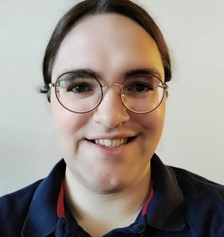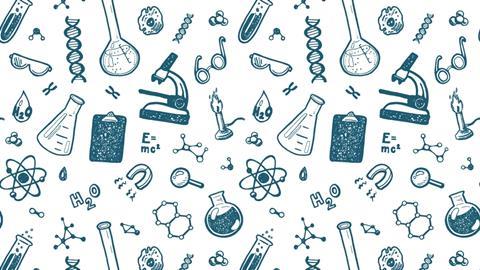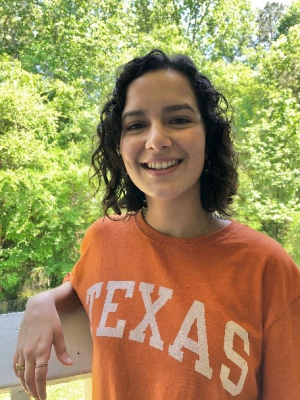MJ Campbell
University of Texas at Austin Chemistry Ph.D. Program Email: melaniecampbell@utexas.eduStructural characterization and quantitation of ether-linked glycerophospholipids in biologically relevant models via ultraviolet photodissociation mass spectrometry
MJ Campbell earned a Bachelor of Science in chemistry from The Ohio State University in 2021. Shortly after she joined Dr. Jennifer Brodbelt’s research group which utilizes mass spectrometry paired with ultraviolet photodissociation to probe biomolecules. Her research primarily focuses on the identification and quantitation of ether-linked glycerophospholipids in type 2 diabetic models in hopes of uncovering biomarkers for early detection. Characterization of the heart tissue of this model has the potential to reveal how the dysregulation of ether-linked glycerophospholipids in type 2 diabetes may lead to cardiovascular disease.

Charlie Johnson
University of Texas at Austin Biomedical Engineering Email: cdjohnson98@utexas.eduComputational and experimental exploration of the mutational landscape of genetically-encoded, transcription factor-based biosensors
Charlie Johnson received a B.S. in Biomedical Engineering from Texas A&M in 2021. Charlie’s research focuses on using computational and experimental techniques to study and engineer genetically encoded, transcription factor-based biosensors to aid in the development of enzymatic drug manufacturing and highly selective diagnostics. Charlie’s current project focuses on the development of a genetically encoded stereoselective biosensor.
Isabelle Rodriguez
University of Texas at Austin Analytical Chemistry Email: isar348@utexas.eduDevelopment and optimization of DNAzyme based biosensors for metal detection in plants
Isabelle Rodriguez earned a B.S in Chemistry from Columbus State University in 2021. Her graduate research focuses on developing various strategies for introducing DNAzymes for metal detection in plants. The capabilities of DNAzymes have yet to be explored in plant systems and offer the opportunity for understanding the role of metals in plant development, metabolism, and environmental stress responses.
Sara Nixon
University of Texas at Austin Chemistry Ph.D. Program Email: s.nixon@my.utexas.eduEngineering DNA Switches to Control Enzyme Activity
Sara Nixon earned a B.A. in Chemistry and Economics from Kalamazoo College in 2020. Her graduate research focuses on the creation of a DNA-regulated, enzyme-amplified detection platform. Some of the most powerful diagnostic platforms such as PCR, make use of the interaction between DNA and enzymes. The leveraging of these interactions offers an exciting avenue for the development of diagnostic platforms.
Diane Madeksho
University of Texas at Austin Chemistry Ph.D. Program Email: dmadeksho@utexas.eduFabrication and Characterization of Immobilized Acetylcholine Esterase Based Biosensors for the Detection of Organophosphate Pesticides
Diane Madeksho earned a B.S. in Biochemistry from the University of Tennessee at Chattanooga. Her graduate research focuses on immobilizing acetylcholine esterase on a solid support to function as a detection platform for organophosphate pesticides. These pesticides are widely used in agriculture, posing a major threat to wildlife and human health, and there is a need for a rapid and portable sensor.
Katie Zuercher
University of Texas at Austin Chemistry Ph.D. Program Email: ksz265@my.utexas.eduFast Lipid Analysis of Lipid A Coupled with Ultraviolet Photodissociation Mass Spectrometry
Katie Zuercher earned a B.A. in Chemistry and Biology from Bethany College (Lindsborg, KS) in 2021. Her graduate research focuses on characterizing lipid A directly extracted from the surface of Gram-negative bacteria and investigating the effects of lipid A modifications on antibiotic resistance.






